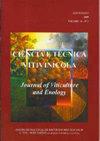葡萄籽原花青素B2-3′- o -没食子酸酯纳米颗粒:制备、表征和抗氧化活性
IF 0.9
4区 农林科学
Q4 FOOD SCIENCE & TECHNOLOGY
引用次数: 0
摘要
本研究以壳聚糖-海藻酸钠为原料制备葡萄籽原花青素B2-3′- o -没食子酸酯纳米颗粒。采用透射电镜(TEM)、傅里叶红外光谱(FTIR)、x射线衍射(XRD)和差示扫描量热法(DSC)对包封体系进行了表征,并通过细胞水平的抗氧化能力分析了包封体系的生物活性。结果表明:所制备的纳米载体粒径为160~201nm, B2-3′- o-没食子酸酯包埋效果良好,包封率为93.5%;体外消化实验表明壳聚糖-海藻酸钠纳米体系通过异常扩散机制显著控制B2-3′- o-没食子酸酯的释放,在胃肠道条件下,B2-3′- o-没食子酸酯约有72-78%的残留。此外,细胞毒性实验结果表明,B2-3′- o -没食子酸酯壳聚糖纳米颗粒对过氧化氢诱导的人HepG2细胞具有明显的保护作用。本研究为控制葡萄渣中最重要的一类生物活性多酚——没食子酸原花青素的传递和提高其生物活性提供了一条有希望的途径。本文章由计算机程序翻译,如有差异,请以英文原文为准。
Nanoparticles loaded with procyanidin B2-3′-O-gallate from grape seed: preparation, characterization and antioxidant activity
The aim of this study was to prepare nanoparticles of grape seed procyanidin B2-3′-O-gallate by chitosan-sodium alginate. The encapsulation system was characterized by transmission electron microscope (TEM), Fourier transform infrared spectroscopy (FTIR), X-ray diffraction (XRD) and differential scanning calorimetry (DSC), and its biological activity was analyzed by cell-level antioxidant capacity. The results showed that the particle size of nano-carrier was 160~201nm, the B2-3′-O-gallate was well embedded, and the encapsulation efficiency of B2-3′-O-gallate was 93.5%. In vitro digestion experiments suggested that the release of B2-3′-O-gallate was significantly controlled by chitosan-sodium alginate nano-system through anomalous diffusion mechanism, and at about 72-78% of B2-3′-O-gallate was retained under gastrointestinal (GI) condition. Besides, the cytotoxicity results expressed that B2-3′-O-gallate chitosan nanoparticles had obvious protective effect on human HepG2 cells induced by hydrogen peroxide. This work provides a promising way to control the delivery and enhances the biological activity of galloylated procyanidins – one of the most important group of bioactive polyphenols of the grape pomace.
求助全文
通过发布文献求助,成功后即可免费获取论文全文。
去求助
来源期刊

Ciencia E Tecnica Vitivinicola
Agricultural and Biological Sciences-Food Science
自引率
12.50%
发文量
5
期刊介绍:
Ciência e Técnica Vitivinícola (Journal of Viticulture and Enology) is an international journal that publishes original articles, research notes and review articles, written in Portuguese or in English, on the various fields of the science and technology of vine and wine: Viticulture, Enology and Vitivinicultural economy.
 求助内容:
求助内容: 应助结果提醒方式:
应助结果提醒方式:


